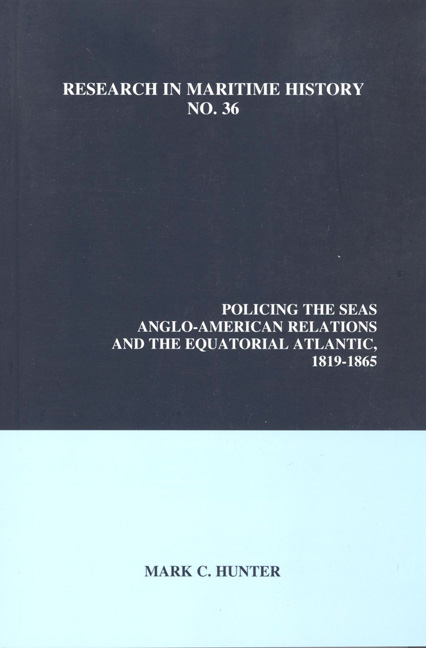Book contents
- Frontmatter
- Contents
- List of Tables
- List of Illustrations
- About the Author
- Acknowledgements
- Chapter 1 Introduction
- Chapter 2 The Atlantic
- Chapter 3 Anglo-American Policymaking, 1819-1834
- Chapter 4 Naval Relations and the Suppression of Piracy and Slaving, 1820-1830
- Chapter 5 A Naval Compromise, 1830-1842
- Chapter 6 The Royal Navy and West Africa, 1843-1857
- Chapter 7 The US Navy and West Africa, 1843-1857
- Chapter 8 Conflict Avoidance in the Equatorial Atlantic
- Chapter 9 The Civil War and Conflict Resolution in the Equatorial Atlantic
- Select Bibliography
Chapter 5 - A Naval Compromise, 1830-1842
- Frontmatter
- Contents
- List of Tables
- List of Illustrations
- About the Author
- Acknowledgements
- Chapter 1 Introduction
- Chapter 2 The Atlantic
- Chapter 3 Anglo-American Policymaking, 1819-1834
- Chapter 4 Naval Relations and the Suppression of Piracy and Slaving, 1820-1830
- Chapter 5 A Naval Compromise, 1830-1842
- Chapter 6 The Royal Navy and West Africa, 1843-1857
- Chapter 7 The US Navy and West Africa, 1843-1857
- Chapter 8 Conflict Avoidance in the Equatorial Atlantic
- Chapter 9 The Civil War and Conflict Resolution in the Equatorial Atlantic
- Select Bibliography
Summary
By 1842 Anglo-American interests had converged sufficiently to reach an agreement on naval cooperation along the’ West African coast. Although the tactical use of sea power to hunt slave traders and to provide commerce protection had the potential to generate Anglo-American conflict, the strategic decision to use i to further long-term objectives peacefully provided a conduit through which the nations could reduce tensions. In Britain, lobbyists like Fowell Buxton pressured the government to use the Royal Navy (RN) to suppress the slave trade to promote legitimate African commerce. But leaders like Lord Palmerston and Sir Robert Peel subscribed to the liberal philosophy of only pushing other powers so far over issues like slave-trade suppression. Cooperation was preferable to war. Britain connected the growth of African commerce with the suppression of the slave trade but refrained from using force to impose its views on “established” nation-states. The US government also came under increasing pressure from Northern merchants to protect and promote avenues to increase commerce in places like the West African coast.
By the early 1840s Secretary of State Daniel Webster and Secretary of the Navy Abel P. Upshur promoted the use of the US Navy (USN) to achieve peaceful, strategic goals. But the political climate in the US remained wary of slavery-related issues, and Anglo-American tensions remained high over the issue of the freedom of the seas. The Amistad and Creole cases, for example, raised the ire of many in the South who feared that the authorities might interfere with slavery. But a rebellion in Canada, and the Maine-New Brunswick border dispute, provided opportunities to settle outstanding bilateral issues. Peel sent Lord Ashburton to Washington for talks with Webster that led to a settlement of the border dispute and agreement on a plan for cooperation in West Africa. British liberalism and America's growing commercial ambitions meant that a compromise was possible over the use of sea power on the African coast. While American and British warships would cruise in pairs, to avoid conflict the USN would stop suspicious American-flag vessels, and the RN would only stop suspicious vessels belonging to other nations.
- Type
- Chapter
- Information
- Policing the SeasAnglo-American Relations and the Equatorial Atlantic, 1819-1865, pp. 105 - 132Publisher: Liverpool University PressPrint publication year: 2008

